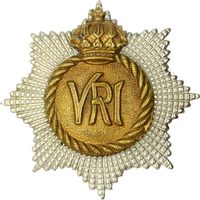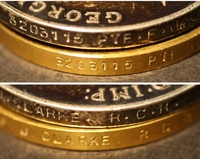
3203115 Private Frederick James Clarke
The Royal Canadian Regiment
By: Capt (ret'd) Michael M. O'Leary, CD, The RCR
Frederick James Clarke was born at Halifax, Nova Scotia, on 09 Apr 1899. He would have been fifteen years old when the Great War started and, living in Halifax, his teenage years would have been filled with the comings and goings of soldiers, troopships and warships in the streets and harbours of his hometown. Little wonder that he too was in uniform at the age of 17, serving with the 63rd Regiment, Halifax Rifles.
Interestingly, while Fred Clarke gave his birth year as 1899 at attestation, that is not what is recorded in the preceding Canadian censuses. The 1901 Census gives his birth date as 9 Jun 1900, while the 1911 Census gives it as 10 Apr 1901.
Perhaps he'd made a deal with his mother not to try and go overseas before his 19th birthday, if that was in fact his 19th birthday, but it was only days after that milestone as far as we know from his service record, on 12 Apr 1918, that Frederick Clarke attested for overseas service. At the time of his attestation, Clarke was stationed on McNab's Island, an island at the mouth of Halifax Harbour that was used at the time for military training and had fortifications that were part of the harbour defence system.
Clarke identified his civilian trade as "teamster". He was 5' 7" tall, with a 35-inch chest, dark complexion, brown eyes, and dark brown hair, He lacked any scars or distinctive marks worth noting on the attestation form. Private Clarke's next of kin was Mrs Gertrude Clarke, his Mother who was living in Halifax.
Having attested for overseas service in that spring of 1918, 3203115 Private Frederick James Clarke began with the 1st Depot Battalion of the Nova Scotia Regiment, in a Special Draft formed from the 63rd Regiment. As a Special Draft from a standing Militia Unit employed on local defence duties these soldiers heading overseas did not, perhaps, need the same lengthy training as other had undergone before sailing. Accordingly, it was less than two months later that Clarke found himself boarding the H.M.T. Waimana on 25 Jun 1918, heading for England. The Waimana was a small, single stack, liner (8129 tonnes) completed in 1911 for the Shaw, Savill & Albion Co. Ltd. of Southampton. She served as a troopship in both the First and Second World Wars.
On 7 Jul 1918, Clarke disembarked in England and was taken on Strength of the 17th Reserve Battalion in Bramshott. And here he waited it was his turn to join a draft crossing the channel to France. Eventually his number cam up, and on 30 Oct 1918 Frederick Clarke was taken on strength The RCR in the field and proceeded to France for service with The R.C.R.
Once in France, Clarke spent just over a week waiting at the Canadian Corps Reinforcement Camp until he was sent forward on 8 Nov 1918 to join The R.C.R. in the field.
We can only imagine how tumultuous things were behind the lines in those days leading up to the Armistice. How difficult was it for groups of soldiers to move forward with military operations in the closing days of the War taking precedence on all routes and means of transportation? Clarke and the other soldiers travelling with him may have left the C.C.R.C. on 8 Nov, but it was not until 13 Nov 1918 that his service record notes that he "joined The R.C.R. in the field."
The RCR War Diary for 13 Nov 1918 notes Clarke's arrival in a stereotypically dry fashion:
13-11-1918. - MONS
Training carried out during the morning. Battalion engaged in cleaning up, reorganizing, and re-fitting equipment.
Lieut. D.A. PORTER rtd. from leave.
24 O.Rs. from C.C.R.C.
Two days late for the War perhaps, but he was in the theatre of operations and on the strength of a unit for three days before that final hour of 11 a.m. of 11 November. That minor distinction would mean that Clarke would receive both the British War Medal and the Victory Medal for his service.
Clarke would serve with The RCR for three months before his name appeared on repatriation lists. On 05 Feb 1919 he was struck off the unit's strength for demobilization and proceeded to England the next day. His trip home would not be without hurdles. Once in England Clarke was hospitalized on 20 Feb 1919. He was admitted to No. 12 Canadian General Hospital, Bramshott, first with a diagnosis of Bronchitis, which was later changed to Laryngitis.
Upon confirming the lesser diagnosis, No. 12 Canadian General Hospital was ready to move him on to a more suitable facility and on 21 Feb 1919, pronounced Clarke fit to travel with the following chit: "This is to certify that the marginally named soldier is free from vermin, Venereal and Contagious Diseases, and is fit to travel." he was therefore transferred on 23 Feb 1919 to No. 4 Canadian General Hospital, Basingstoke. Clarke was discharged from No. 4 Cdn. Gen. Hosp. on 24 Mar 1919.
Once out of the hospital system, Clarke would join the thousands of soldiers being processed for repatriation to Canada. Accordingly, he began moving between the various units that controlled portions of that journey. On 26 Mar 1919, Clarke was taken on strength of the 17th Reserve Battalion from the Nova Scotia Regimental Depot. On 16 Apr 1919 he proceeded to the next station when he was struck off the strength of the 17th Reserve Battalion to come under the control of Military District No. 6 at Kinmel Park
Ten days later, while still at Kinmel Park, Clarke was attached to the C.C.C. Kinmel Park for return to Canada.. Finally, 7 May 1919 his status changed again as he was taken on the strength of No. 6 District Depot (Halifax) from overseas. That same date Frederick Clarke embarked on board the S.S. Celtic for the voyage to Canada. On 14 May 1919, Clarke disembarked at Halifax On 22 May 1919, Private Frederick Clarke's service with the Canadian Expeditionary Force would end. He was discharged at Dispersal Station "B" of Military District No. 6 "by reason of demobilization."
In addition to the two medals he would receive in 1923 (the sheer magnitude of the medal program meant it would take years to distribute them to the soldiers), Clarke would also be issued War Service Badge Class "A", No. 310237.
Following his service, Clarke would receive a War Service Gratuity. The form for this allowance noted his total service as "Canada - 2 years, 3 months; Overseas - 10 months (17th C.R.B., The R.C.R., 17th C.R.B.)." For this period of service, he received a War Service Gratuity for 183 days service of $420, which was paid to him in six monthly allotments of $70 from May to October 1919.
In a straightforward bureaucratic examination of his service years later, a DVA Statement of Service in the Canadian Armed Forces prepared on 02 Oct 1967 would pronounce his three days in France before the Armistice as worthy of the description: "Served in France with The R.C.R."
Frederick Clarke died at the Camp Hill Hospital, Halifax, Nova Scotia, on 29 Jun 1970. He was 71 years of age.
Reunited: Frederick Clarke's medals were one example of many soldiers' medals that became separated over the decades since he received them. Clark's Victory Medal was purchased from an Ottawa militaria dealer in May 2007. Clarke's British War Medal was purchased from a researcher in Washington State, USA, in March 2009. "Reunites" which restore a soldier's medals to their full groupings are rare, and are celebrated by the collectors who achieve them.
Pro Patria
Visit a randomly selected page in The O'Leary Collection (or reload for another choice):
- The O'Leary Collection; Medals of The Royal Canadian Regiment.
- Researching Canadian Soldiers of the First World War
- Researching The Royal Canadian Regiment
- The RCR in the First World War
- Badges of The RCR
- The Senior Subaltern
- The Minute Book (blog)
- Rogue Papers
- Tactical Primers
- The Regimental Library
- Battle Honours
- Perpetuation of the CEF
- A Miscellany
- Quotes
- The Frontenac Times
- Site Map
QUICK LINKS
The O'Leary Collection—Medals of The Royal Canadian Regiment
Newest additions:
![]()
![]() SB-12725 Private Henry "Hank" Ard
SB-12725 Private Henry "Hank" Ard ![]()
WIA at Hill 187, Died of Wounds in Japan
![]()
![]() 2355331 Lance Corporal Albert Lorking
2355331 Lance Corporal Albert Lorking
Wounded in action, later a War Amps representative.
![]()
![]() 4334 / 477996 Pte Isaac Hamilton Wilcox
4334 / 477996 Pte Isaac Hamilton Wilcox
Permanent Force, South Africa, and C.E.F.
![]()
![]() 477019 Private Harold Ashcroft
477019 Private Harold Ashcroft
Transferred to the Tunnelers.
![]()
![]() 734231 Private Clark D. Thompson
734231 Private Clark D. Thompson ![]()
The older Thompson brother, killed in action.
![]()
![]() 733849 Private Norman Parker Thompson
733849 Private Norman Parker Thompson
The younger Thompson brother; post-war service in the Special Guard.
![]()
![]()
![]() A305 / 400305 Private Andrew Walker
A305 / 400305 Private Andrew Walker ![]()
"Previously reported Wounded, now Killed in Action."
![]()
![]() 823298 Pte Thomas Patrick Steele, M.M.
823298 Pte Thomas Patrick Steele, M.M. ![]()
… for gallant conduct in the field …
![]()
![]() P13066 Sergeant Harold Thompson
P13066 Sergeant Harold Thompson
Instrumental Soloist for over 20 years of Canadian Army service.
![]()
![]() 9609 / 477728 Private Albert Edward Piper
9609 / 477728 Private Albert Edward Piper
"Arrived from England as a STOWAWAY …"



